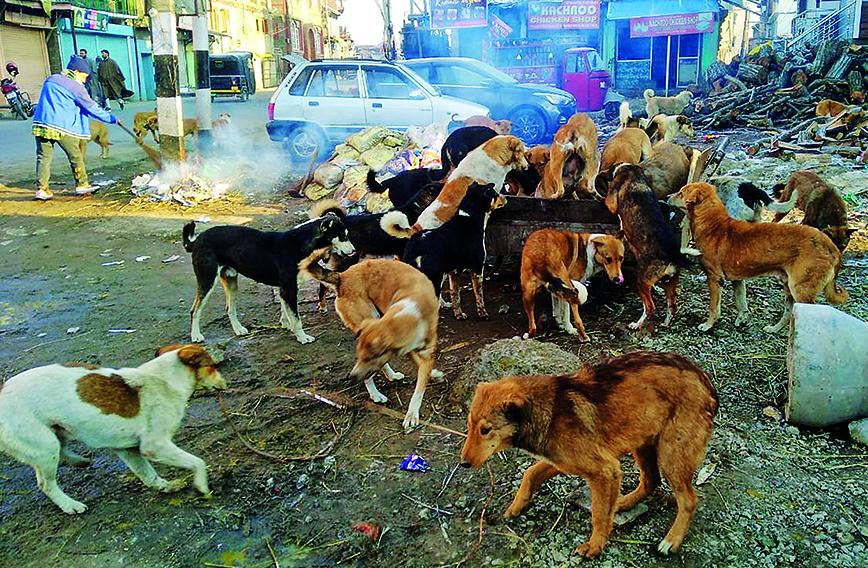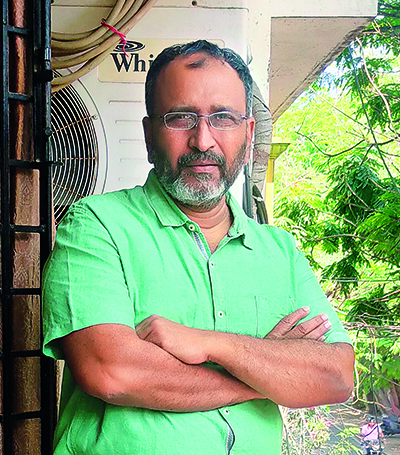
Dogs scramble for scraps at a garbage bin. Life on the street is no fun | Civil Society pictures/Bilal Bahadur
‘So-called activists only want to have dogs in the street’
Civil Society News, New Delhi
IN the last week of February, a two-year-old girl was killed by a pack of five street dogs in Tughlak Lane, in the heart of Lutyens’ Delhi. The high and mighty have their bungalows here and you might well ask what free-roaming, dangerous dogs were doing in such a neighbourhood in the Indian capital.
The attack was one of many that have been taking place in India’s cities where the stray dog population could be in millions. Such is the scale of the problem now that even a Tughlak Lane which should be free of such a hazard is affected.
At the root of the problem are elliptical rules sponsored by animal lovers. They promote the feeding of dogs in public spaces. The rules also prevent the removal of dogs on the streets even if they bite and kill.
Called the Animal Birth Control (ABC) Rules, they are supposed to bring down the population of strays through sterilization, but, in reality, the opposite has happened. The number has continued to rise, reaching what is now seen to be alarming proportions.
The little girl who was killed in Tughlak Lane was a washerman’s daughter. The record shows that the poor are more likely to be targets of such attacks. But the rich and middle class are being equally affected. People out on walks carry sticks to protect themselves. Housing societies, where a few residents insist on feeding dogs, have become scenes of acrimonious battles.
Failing to get relief from the administration, which is bound by the rules, people have been approaching the courts. A bunch of cases is before the Supreme Court. But even so residents continue to turn to the high courts.
The original case, asking the Bombay High Court to intervene, was filed more than 20 years ago by a Goan paediatrician, Dr Menezes, who got together with friends to start PEST or People for the Elimination of Stray Troubles. The good doctor was motivated to act after a patient came to him with her nose bitten off. There is as yet no verdict in that case and several others that have been clubbed with it.
In the meantime, there have been more cases that have come before the lower judiciary and the high courts all over India. Frustration with the stray dog problem has been mounting.
Cobbling together petitions and finding lawyers is not easy. Courts also move slowly, testing the stamina of the average litigant. Well-funded NGOs are also tough to take on. They are well connected and have time and resources.
Nevertheless, the dog activists seem to be running into more opposition than they have in the past.
People are questioning whether dogs should be protected at the cost of human lives. The Kerala high court recently ruled that human lives should not be put at risk.
 |
| S. Muralidharan |
The ABC Rules are also seen as being out of line with the parent law on the prevention of cruelty to animals which says that animals should be got off the streets and put in shelters and where necessary euthanized.
To get a ringside view of what it is like to file a case and what the arguments against having dogs on the streets are evolving, we spoke to S. Muralidharan who has approached the Madras High Court and believes he is on strong ground.
Muralidharan’s case is that the rules are unconstitutional since they contradict the provisions of the parent act. He also argues that they are not in keeping with global best practices. Feeding dogs on streets turns them into ferocious packs, he says. Instead, they should be picked up as is done all over the world.
Muralidharan says Indian and foreign NGOs are soaking up foreign donations and working in concert with pharmaceutical companies producing anti-rabies vaccines.
Q: What prompted you to go to the Madras High Court on the issue of street dogs?
There are a couple of sides to this. I am an animal lover. I used to rescue pedigreed dogs abandoned on the street, keep them in a shelter and give them for adoption. The dogs mainly had skin infections. The shelter was run purely on donations. There came a time when we couldn’t afford it and shut it down. Before that I used to volunteer with Blue Cross in Chennai where the conditions were horrible.
Q: For how long did you run your shelter?
We ran it from 2013 till 2022. There were two learnings in those nine years. One is, as long as you run a shelter, people will keep dumping dogs there. The dogs are essentially healthy and need love and care. The other thing is it was not sustainable running it on donations. The trustees had a meeting and decided to shut it down, but we at the same time decided to continue with our advocacy supporting street animals, pedigree and all kinds.
Q: Of course you see yourself as an animal lover.
Yes, I’m an animal lover. I was feeding stray dogs during the pandemic. Now that gave me the biggest learning. Because I realized that when you feed them every day, they get hooked on to you and they’re going to wait for you every day at a particular time, particular place till you arrive and feed them. The biggest learning was they become addicted and they become lazy and they stop fending for themselves. And they get into hunting in packs. Whether they see another cat or a smaller dog, you know, it could be a small child. One of them will go and just pull that small baby or a small kitten or another puppy. The rest of them will join it within a few seconds.
The other side of it is dogs are abused on the streets. It’s not that they’re having a jolly good time. People abuse dogs and vehicles run them over. Street dogs actually have nothing. They eat from garbage bins and drink wastewater. In heavy rain or hot weather, they don’t have shelter.
Q: You’ve gone to the court specifically on the ABC Rules, 2023. You have said that they are not in the interests of human beings or dogs.
Yes, that is correct.
Q: What are you seeking from the court?
There are some eight million dog bites happening across India every year. This amounts to Rs 1,600 crore worth of vaccine being procured. It is only the pharmaceutical companies and processed food companies that are gaining from having dogs on the streets. Dogs and humans are not benefitting.
The ABC Rules are forcing people to feed dogs. I’ll give a small example. A dog starts biting people. The normal reaction of people is to chase it and beat it up. So, this dog takes refuge in a housing society. From that moment, under the Rules, it becomes the responsibility of the RWA to feed the dog, sterilize the dog, and also vaccinate the dog. After that, there will be a bunch of people who will feed the dog. There will be those who will oppose the feeding. They will probably beat each other up. We have seen this happening in Mumbai and Delhi and many other places. To resolve the dispute a committee has to be constituted involving police and animal welfare officials.
The Rules are a cruel joke. They are absolutely bizarre. It is as if no one has anything else to do but feed street dogs.
They want you to feed the dog. Then they are expecting a dispute. Then they want you to solve the dispute. I mean, who has time for all this?
They have also come up with a new term ‘Community Animal’. Nowhere in the world is there such a term. Anything which is stray is a threat to human life. Something which is on the road, which is a threat to you, has to be taken away and that is the function of the local municipality or panchayat. Even the Prevention of Cruelty to Animals Act (PCAA) says animals have to be taken off the street and dogs are to be euthanized in a gas chamber or whatever as per the law. The PCAA is the parent act and rules framed under it cannot be contrary to its provision. That is why I have said that the ABC Rules are unconstitutional.
The ABC Rules also say that if a dog is found to be aggressive, chasing people or biting people, the dog should be taken away from that place, kept in an animal welfare organization, observed for 10 days to ensure it doesn’t have rabies. But if after 10 days, if it’s found okay, it will be released back in the same place. Undoubtedly, so that it can bite some more people!
How ridiculous is this? I have said to the court to take away these two rules. Please form rules that we impound all the animals. Because of the numbers it would have to be in a phased manner. It can’t happen overnight. In fact, the Tamil Nadu government has already allocated some Rs 20 crore last year for animal welfare of which `10 crore has been wasted on NGOs who are pretending to be doing animal welfare. I say let’s start impounding them in a phased manner.
Q: How many stray dogs are there in Tamil Nadu?
Tamil Nadu has the second highest dog bites in the country which is around 800,000, next to UP, which has something like one million a year. Nationally it is about eight million. Multiplied by Rs 2,000 for the rabies injections it comes to Rs 1,600 crore that goes straight to the pharmaceutical companies.
These pharmaceutical companies in turn fund these NGOs and they in turn will come to the street and protest saying that you can’t take my dog away.
Q: But how many stray dogs do you think are there in Tamil Nadu?
If nationally there are about 60 million, Tamil Nadu would have eight to 10 percent of that. So, you are looking at about five million stray dogs.
Q: Would `20 crore be enough?
A good start, I would say. May not be enough overnight. If you’re going to do all the dogs, then it’s not going to be sufficient. But it’s a good start.
Q: With such a large number of dogs, what is the solution you’re offering the court?
I’m telling them, take them in and impound them in a phased manner.
Q: After you impound them, what happens?
That’s their job. I’m saying keep the human beings safe. Keep the wildlife safe. Keep me safe and my children safe. You take them away. Do whatever you want.
Q: In a way what you are saying is what the animal activists are saying — that it is the responsibility of the government to take care of stray dogs.
No, not at all. I am saying the government must take responsibility for dealing with the problem. But the so-called animal activists really want to keep the dogs on the streets and they want to fight for it. They are actually part of the problem.
If there’s a law, they will not perpetuate dogs on the street. Can you do the same thing with a baby monkey or a ringneck parrot? You can’t because there is a law. The Forest Department will come and sue you. They will fine you. Without a law, street dogs eventually become a tool for timepass. They’re actually multiplying the mess, which is already created. Yes, dogs should be taken care of, but not on the streets.
Comments
Currently there are no Comments. Be first to write a comment!



